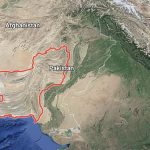BLOOMBERG
The United Nations is working to map glaciers in northern Pakistan to quantify the melting of ice caused by warming temperatures and set up early-warning systems to help the recently flood-hit nation adapt better to future climate risks.
The UN Development Program plans to map 5,000 glaciers in the next eighteen months, Knut Ostby, the agency’s resident representative in Pakistan, said in an interview. The South Asian nation is home to the world’s largest number of glaciers.
The exercise takes on urgency because rapid glacial melt has formed several lakes in the mountains, adding to higher flood risks in the lower reaches. This year unprecedented flooding has devastated Pakistan – killing more than 1,500 since June and causing damage estimated to be well over $10 billion as nearly one-third of the country was inundated by the deluge.
The climate catastrophe laid bare the country’s climate vulnerability and its lack of preparedness.
The plan will help with “ideas on how to find a comprehensive solution to the melting of what we call the third pole,” said Ostby, referring to the the snow-covered Hindu Kush-Himalaya-Karakoram mountains of South Asia. The glaciers across these three ranges are considered the largest store of permanent ice and permafrost outside the Earth’s north and south poles.
The agency is setting up early warning systems in 24 valleys in northern parts of the provinces of Gilgit Baltistan and Khyber-Pakhtunkhwa, which were among the areas hit by this year’s floods. Similar systems will be needed in over a 110 valleys in the northern parts of the country, Ostby said.
The UNDP is also helping the government negotiate a disaster risk insurance plan with international reinsurance companies, Ostby said. Among the world’s 10 most climate vulnerable nations, Pakistan has so far received $154 million in climate funds, he said.
The UN’s appeal to raise $160 million for flood victims has seen a commitment of $150 million so far, Ostby said.
![]()





